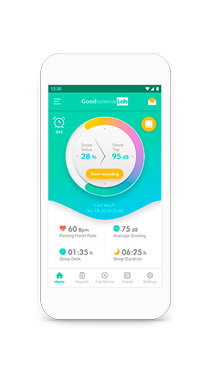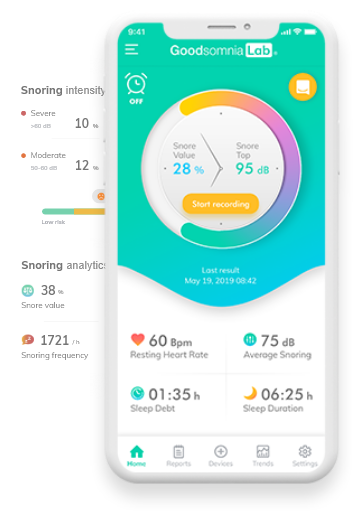Heart disease is a big problem, but what about snoring? ‘Come on, it’s just snoring!’ some might say. But would you change your mind if you knew there’s a link between heart disease and snoring?
Sometimes snoring is the symptom of obstructive sleep apnea, a chronic condition that dramatically impairs sleep quality. Snoring causes damage to your breathing. Normal breathing during sleep is a must for renewing the energy and balancing body processes. Heart and brain are the first internal organs to suffer if breathing is obstructed. So snoring and heart attacks are inter-linked.
The most dangerous types of snoring during heart attacks, and other cardiac disorders, obesity, diabetes, pre-stroke conditions, etc. need timely diagnosis and treatment. Let’s see how these connections originate.
The link between snoring and heart disease
To understand ‘How snoring is related to heart disease?’ or ‘How does snoring affect your heart?’ one must recall the essentials of human physiology. Nose and mouth are the doors to oxygen. We breathe in air which flows to the lungs; oxygen is absorbed into the blood and transmitted all over the body.
Snoring appears at the start of a respiratory cycle, in the upper airways, causing damage to the rest of the phases. Why is snoring bad for your heart? Because when the heart doesn’t get enough oxygen, it makes your vessels more narrow to increase blood flow and get more oxygen. As a result, the pressure on vessels grows too. Such pressure fluctuations can cause chronic hypertension or even heart attack.
Does snoring cause heart attacks?
Snoring can be a sign of heart disease, hypertension, stroke, heart attack, and other severe issues like diabetes and obesity. The reason is that it’s hidden in body liquids: blood and hormones. Blood is the source of oxygen to all body parts. Brain, dependent on oxygen too, produces hormones that manage the normal flow of numerous body processes, including blood pressure, the regularity of heartbeats, etc. A snoring sound can be an alarm signal for a heart attack or other health risks.
The narrowing of vessels is a normal reaction to a lack of oxygen intake. A heart attack happens due to the block of blood flow to the heart, often caused by a blood clot. When this clot breaks away from the vessel, gets into the blood flow and travels to the heart, it blocks one of the channels, and a person can die.
So, if you have any risks of developing cardiac disorders and you’re concerned about that snoring can cause heart attacks, start monitoring your breathing patterns during the night as obstructed breathing brings more harm than you might think.
Can snoring cause heart problems?
Specialists don’t have an exact answer to the question, but it’s apparent snoring and heart problems often work like cause and effect. Is snoring a symptom of heart problems? Is snoring the direct cause of heart problems? Not always. It’s hard to follow the exact connections between these health issues as heart disorders usually develop alongside with other diseases.
Some tools can signal snoring is a sign of heart problems. One such tool is a free mobile app Goodsomnia Lab which records your snoring over several nights, analyzes it and gives information about potential health risks, including heart diseases. Feel free to check it out.














